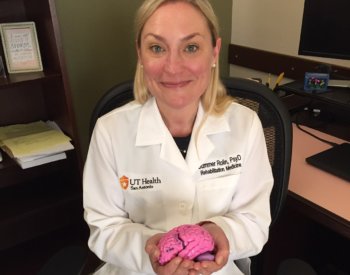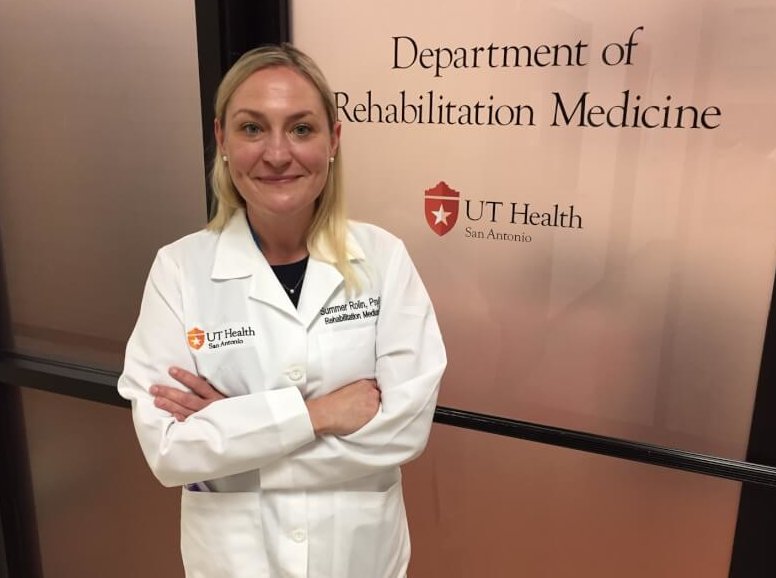Studies show COVID-19 a compounding factor
Contact: Steven Lee, 210-450-3823, lees22@uthscsa.edu
SAN ANTONIO – When U.S. gymnast Simone Biles pulled out of the all-around competition at the Olympic games citing mental health concerns, Summer Rolin nodded knowingly.
She counsels Olympic speedskaters, and with a doctorate in psychology is a clinical neuropsychologist at The University of Texas Health Science Center at San Antonio, also known as UT Health San Antonio. She also screens student-athletes for mental health issues at The University of Texas at San Antonio (UTSA).
“When I look at my Olympic athletes, it’s just devastating for them not to be able to do what they want at the level they want to do it,” Dr. Rolin said. “The athletic condition is almost primed to have some of these mental health problems – high stakes, high pressure, high anxiety.”
And with student-athletes, she says, “You’re also going to college. And you’re also trying to have a normal college social life.”
That’s why UT Health San Antonio and UTSA partnered to make mental health assessments part of pre-participant evaluations for student-athletes. In addition to full physicals with concussion testing, EKGs and lab work, the evaluations now include screenings for depression, anxiety, substance abuse, sleep disorders, ADHD and other conditions. The COVID-19 pandemic has compounded these issues.
 Neuropsychology is more than psychotherapy for depression, Dr. Rolin says, as it also looks at how the brain is running. She likens the practice to hooking up a car for diagnostic testing, only her tests reveal cognitive functioning, with treatment or rehabilitation directed to areas that need attention.
Neuropsychology is more than psychotherapy for depression, Dr. Rolin says, as it also looks at how the brain is running. She likens the practice to hooking up a car for diagnostic testing, only her tests reveal cognitive functioning, with treatment or rehabilitation directed to areas that need attention.
For adolescents and young adults, that often means academic accommodations, especially after a neuro-trauma like a concussion, when their studies can suffer. However, Dr. Rolin also is a sports psychologist, conducting interventions with athletes and providing individualized therapy tailored to them.
The Houston native joined UT Health San Antonio in February from the University of Utah, where she says mental health very much is part of pre-participation screening. Student-athletes are assessed before the semester starts – and then again at mid- and late-season. The participants take a survey, and if it raises flags, they can be referred for attention.
And if there’s an emergency alert, Dr. Rolin can be onsite for immediate treatment. She saw Olympic speedskaters while in Utah and still counsels them by Zoom, doing performance-based coaching.
The pandemic and mental health
Aside from pressures of performing and going to school, Dr. Rolin said recent NCAA studies show the COVID-19 pandemic has exacerbated mental health concerns – with up to two times more reports of those issues and even PTSD-type reactions than before. Isolation and worry about getting the disease have been triggers, but also racial division.
“The pandemic just really brought out a lot of problems for athletes, including things like racial disparity, access to health care and access to resources,” Dr. Rolin said. “A lot of them might have parents who can’t afford child care for younger siblings. So, instead of living their life as a young adult, they’re at home being a parent at 17. Maybe they lost a family member to COVID – communities just decimated.”
The studies found many student-athletes with personal experiences of racism or racial trauma affecting their mental health, Dr. Rolin said. They can show anger, she said, when actually it is an expression of depression or trauma.
“This will get better with time,” she said, “but I think we also have to provide some resources and services to help.” As many student-athletes come from disadvantaged backgrounds without access to a psychologist, Dr. Rolin’s role is all the more critical.
“It’s great that there is no fee to see me, the student-athletes have direct access and there’s not a question of whether their insurance plans cover my service,” she said. “I think that really equals out the playing field for all the athletes.”
It also is another benefit of a growing partnership between the two institutions, in which UT Health San Antonio is the official health care provider for UTSA Athletics.
“We think it’s a big win for UTSA, in that Dr. Rolin has this expertise and extensive background working with athletes,” said Monica Verduzco-Gutierrez, MD, professor and chair of UT Health San Antonio’s Department of Rehabilitation Medicine. “But it’s a big win for UT Health San Antonio, too, to have a new faculty member with this emphasis on neuropsychology, sports medicine and rehabilitation. It is a talent that both institutions very much want.”
Dr. Rolin, who holds the title of assistant professor of clinical neuropsychology and rehabilitation medicine, has a clinic in the Joe R. and Teresa Lozano Long School of Medicine at UT Health San Antonio and sees student-athletes at UTSA. She plans to expand her practice to first responders as well.
The University of Texas Health Science Center at San Antonio, also referred to as UT Health San Antonio, is one of the country’s leading health sciences universities and is designated as a Hispanic-Serving Institution by the U.S. Department of Education. With missions of teaching, research, patient care and community engagement, its schools of medicine, nursing, dentistry, health professions and graduate biomedical sciences have graduated 39,700 alumni who are leading change, advancing their fields, and renewing hope for patients and their families throughout South Texas and the world. To learn about the many ways “We make lives better®,” visit http://www.uthscsa.edu.
Stay connected with The University of Texas Health Science Center at San Antonio on Facebook, Twitter, LinkedIn, Instagram and YouTube.
To see how we are battling COVID-19, read inspiring stories on Impact.


